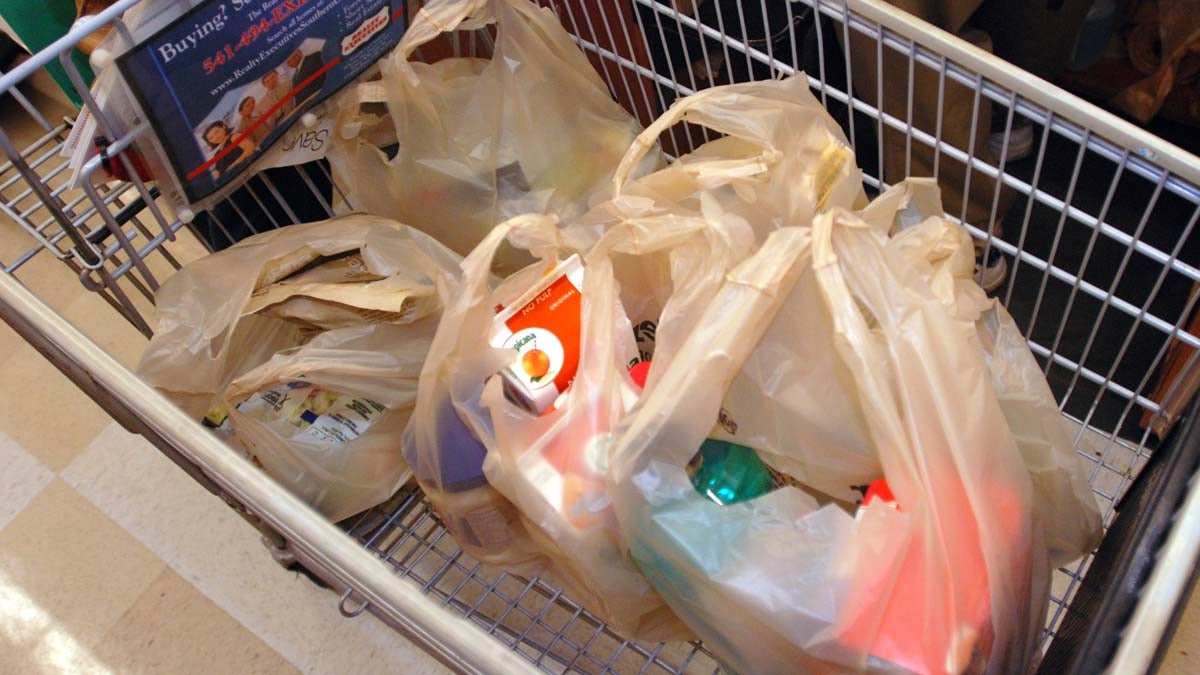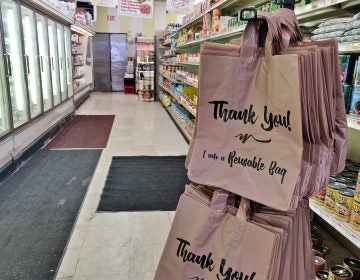19 N.J. cities banned plastic bags in 2018. Philly could join them in 2019.
Nineteen municipalities in New Jersey banned plastic bags in 2018. In 2019, Philadelphia is looking to regulate them as well.

Groceries in plastic bags inside a shopping cart. (AP file photo)
This story originally appeared on PlanPhilly.
—
This might be the year when the public — in the Philadelphia region and across the globe — started to realize where many of our plastic bags and straws end up.
There was the story of the beached sperm whale killed by 64 pounds of trash, much of it plastic bags.
There was the viral video of the sea turtle with a plastic straw stuck up its nose (a video that was, in fact, from 2015 but was shared by tens of millions of people this year).
Even this year’s Earth Day focused on plastic pollution and the damage it does to marine life and our waterways.
“I think 2018 really became, at least from my vantage point, the year that people started to really realize the tremendous amount of problems that we’re facing from plastic,” said Logan Welde, staff attorney for the Clean Air Council. “And, specifically, single-use plastic.”
According to the Clean Air Council, Philadelphians go through about a billion plastic bags per year. Many are discarded on the streets — and then they’re washed down into the sewers. Due to the city’s combined sewer system, they often end up in waterways, where they endanger aquatic life and other wildlife.
City Councilman Mark Squilla plans to propose a bill next year to restrict single-use plastic bags in the city, but the details of the measure are still being worked out.
“Are we doing a ban? Are we doing a fee? It’s still very much up in the air,” said Sean McMonagle, Squilla’s legislative assistant.
“We also have to worry about those that can’t afford the bag fee or a total ban on bags,” he said, adding that low-income residents often can’t afford a reusable bag. His office has discussed various options, including providing bags for those using SNAP benefits or doing giveaways in certain geographical areas.
“It’s all things that we still have to spell out,” McMonagle said.
Other cities and towns in the region are ahead of Philadelphia when it comes to banning or restricting single-use plastics. The borough of Narberth, just outside Philadelphia, issued an ordinance this summer than will require a 10-cent fee on plastic bags and bans plastic straws, with exceptions for disabled customers who may need them.
“Even a small borough like Narberth has a big effect because it shows that people care about it,” said Welde. “And it also shows that there will be a domino-type effect of legislation.”
In New Jersey, 19 municipalities regulated plastic bags in 2018, including Shore towns Belmar, Avalon and Stone Harbor, as well as the cities of Hoboken and Jersey City. Some of the bans and restrictions went into effect in 2018, while others will go into effect next year, beginning as early as Jan. 1, in the case of Brigantine Beach.
“What’s starting to change is people are realizing that towns have the power to do this,” said Doug O’Malley, director of Environment New Jersey. “And what I think is also starting to change is there’s also a rising public consciousness that the plastics we use in our everyday life don’t just disappear when we’re done with them.”
O’Malley said the changes will require a shift in habits and attitudes, but once that happens, other cities and towns will follow suit.
“As these bans go into place, we’re going to start to see a wildfire effect, where other communities are going to say, ‘Hey, what about us?’”
New Jersey is also considering legislation at the state level. Last year, Gov. Phil Murphy vetoed a bill that would have required a 5-cent tax on plastic bags because it didn’t go far enough. Next year, the legislature is expected to consider a bill that would ban plastic bags, plastic straws, and polystyrene containers. It would also impose a 10-cent fee on replacement paper bags, though there are carve outs for certain products including produce bags in grocery stores and straws for those with medical conditions or disabilities.
Myron Arnowitt, Pennsylvania Director for Clean Water Action, also sees momentum building on the issue of single-use plastics. That includes interest from the business community that is often left paying to clean up the litter created by discarded bags.
“On the business side, there’s a realization that it’s in the interest of businesses and small businesses to move away from disposable single-use products like single-use plastic bags, and that’s something which I think is really different now,” he said.
“This is something that can actually happen in 2019.”
WHYY is your source for fact-based, in-depth journalism and information. As a nonprofit organization, we rely on financial support from readers like you. Please give today.



